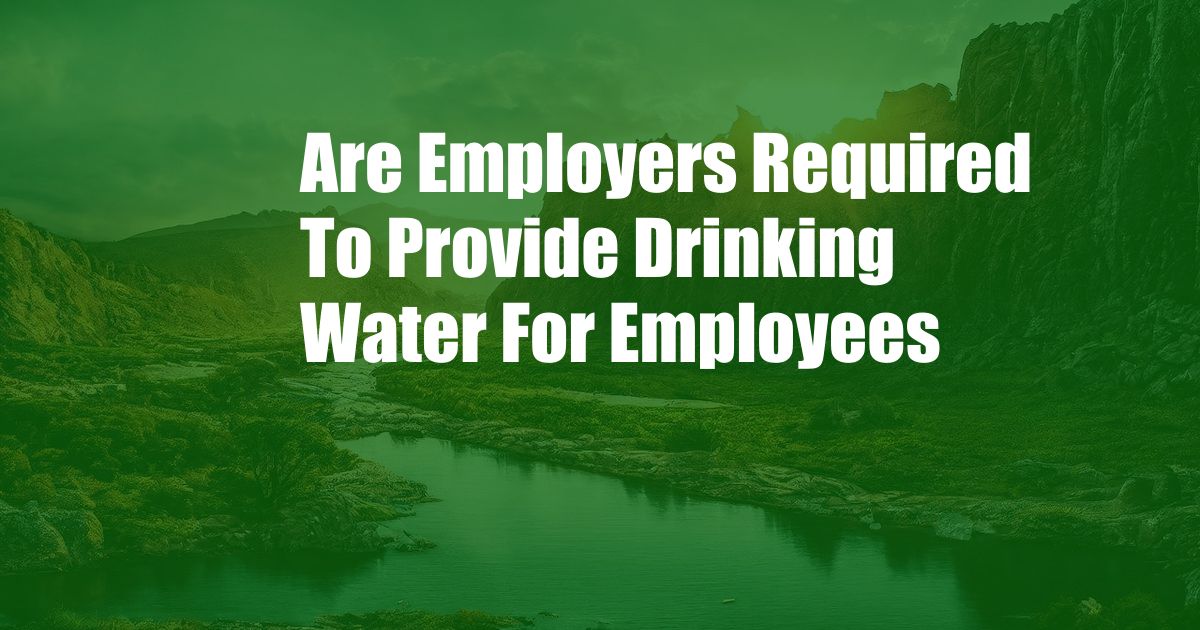
Are Employers Required to Provide Drinking Water for Employees?
Imagine this: you’re hard at work, sweating over that presentation due tomorrow, when suddenly you feel a gnawing thirst. You get up to grab a glass of water, only to realize with horror that the office water cooler is empty. You’re stranded, parched, and desperately in need of hydration. Does your employer have a responsibility to ensure you have access to drinking water during work hours? The answer might surprise you.
The law regarding employers’ obligations to provide water for employees varies from state to state. However, most states have some general requirements that employers must meet, like providing a clean and safe workplace. These laws may or may not specifically address the issue of drinking water, but they can be interpreted to require employers to provide reasonable access to water.
Understanding Your Employer’s Legal Obligations
In most cases, employers are legally required to provide drinking water for employees. This obligation stems from the Occupational Safety and Health Act (OSHA), which requires employers to provide a safe and healthful workplace for their employees. OSHA’s specific requirements for drinking water are outlined in its Sanitation Standard (29 CFR 1910.141), which states that employers must provide “potable water” to employees in “adequate amounts.” This means that employers must provide enough water to meet the needs of their employees, and that the water must be clean and safe to drink.
There are some exceptions to this rule. For example, employers are not required to provide drinking water to employees who work in remote locations where it is not feasible to do so. Additionally, employers are not required to provide drinking water to employees who work in jobs where it is not necessary for their health or safety. For example, employers are not required to provide drinking water to employees who work in offices where there is already access to clean and safe drinking water.
The Latest Trends and Developments
In recent years, there has been a growing trend towards employers providing more and better drinking water options for their employees. This trend is being driven by a number of factors, including the increasing awareness of the importance of hydration, the rising popularity of healthy workplaces, and the growing number of employees who are working in physically demanding jobs.
As a result of this trend, many employers are now installing water coolers and fountains in their workplaces. They are also providing bottled water to employees and offering free or subsidized access to fitness centers that have water fountains. Additionally, some employers are even providing hydration stations that offer flavored water, electrolyte-enhanced water, and other healthy drink options.
Tips and Expert Advice for Employers
If you are an employer, there are a number of things you can do to ensure that you are meeting your obligations to provide drinking water for your employees. Here are a few tips:
- Provide access to clean and safe drinking water in all areas where employees work.
- Provide enough water to meet the needs of your employees, especially during hot weather.
- Consider providing flavored water, electrolyte-enhanced water, or other healthy drink options.
- Encourage employees to drink plenty of water throughout the day.
- Make sure that water fountains and coolers are clean and well-maintained.
By following these tips, you can help to ensure that your employees have access to the water they need to stay hydrated and healthy.
General FAQ on Drinking Water in the Workplace
Q: How much water should I drink each day?
A: The recommended daily water intake is eight glasses of water per day.
Q: What are the benefits of drinking plenty of water?
A: Drinking plenty of water can help to improve your health and well-being in a number of ways, including:
- Improving your mood and energy levels.
- Boosting your immune system.
- Reducing your risk of dehydration and other health problems.
- Helping you to lose weight.
- Improving your skin health.
Q: Are there any risks associated with drinking too much water?
A: Yes, drinking too much water can lead to hyponatremia, a condition that occurs when the sodium levels in your blood become too low. Hyponatremia can cause a number of symptoms, including nausea, vomiting, headaches, and seizures.
Q: What should I do if I think I’m dehydrated?
A: If you think you’re dehydrated, you should drink plenty of fluids and contact your doctor.
Conclusion
Access to drinking water is a basic human right. Employers have a legal obligation to provide drinking water for their employees. By providing access to clean and safe drinking water, employers can help to ensure the health and well-being of their employees.
Would you like to know more about the employer’s obligation to provide drinking water for employees?